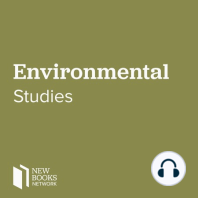44 min listen

Saptarishi Bandopadhyay, "All Is Well: Catastrophe and the Making of the Normal State" (Oxford UP, 2022)
Saptarishi Bandopadhyay, "All Is Well: Catastrophe and the Making of the Normal State" (Oxford UP, 2022)
ratings:
Length:
43 minutes
Released:
Mar 18, 2022
Format:
Podcast episode
Description
All Is Well: Catastrophe and the Making of the Normal State (Oxford UP, 2022) attempts to answer one of the most urgent questions of our time: what is the relationship between modern states and disasters? Disasters are commonly understood as exceptional occurrences that ruin societies and inspire ad hoc rituals of legal, administrative, and scientific control called 'disaster management.' States and the international institutions perform disaster management to protect society. The book challenges this traditional narrative. It interprets 'disaster management' as a historical struggle to conservate the existence and experience of catastrophes and produce idealized authorities capable of protecting society from uncertainty. It examines the emergence of this struggle in the eighteenth century and reveals how rulers and experts struggling to master God, Nature, and each other, inaugurated modern meanings of risk, normalcy, power, and responsibility.
By recovering this history of disaster management, the book reveals underlying legal structures and political-economies that smuggle the unspoken costs of modernity inside the rationalized representation of past catastrophes and future risks. Catastrophes, put bluntly, are not occurrences. They are inventions. Even in their most destructive forms, catastrophes are the stigmata through which the modern state renews itself. The book develops this argument by examining the Marseille plague (1720), the Lisbon earthquake (1755), and the Bengal famine (1770), and showing how eighteenth-century beliefs reverberate in structure and policies of 'global' disaster management today. It concludes that Climate Change and the national and international authorities designed to fight it, are products of three centuries of disaster management, and civilizational survival depends onreckoning with this past.
Learn more about your ad choices. Visit megaphone.fm/adchoices
Support our show by becoming a premium member! https://newbooksnetwork.supportingcast.fm/environmental-studies
By recovering this history of disaster management, the book reveals underlying legal structures and political-economies that smuggle the unspoken costs of modernity inside the rationalized representation of past catastrophes and future risks. Catastrophes, put bluntly, are not occurrences. They are inventions. Even in their most destructive forms, catastrophes are the stigmata through which the modern state renews itself. The book develops this argument by examining the Marseille plague (1720), the Lisbon earthquake (1755), and the Bengal famine (1770), and showing how eighteenth-century beliefs reverberate in structure and policies of 'global' disaster management today. It concludes that Climate Change and the national and international authorities designed to fight it, are products of three centuries of disaster management, and civilizational survival depends onreckoning with this past.
Learn more about your ad choices. Visit megaphone.fm/adchoices
Support our show by becoming a premium member! https://newbooksnetwork.supportingcast.fm/environmental-studies
Released:
Mar 18, 2022
Format:
Podcast episode
Titles in the series (100)
Gregg Mitman, "Empire of Rubber: Firestone's Scramble for Land and Power in Liberia" (New Press, 2021): An interview with Greg Mitman by New Books in Environmental Studies